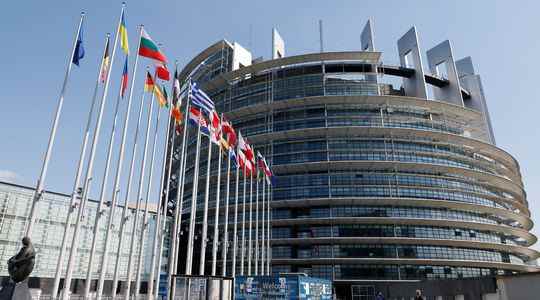In his first speech on Europe since his re-election as President of the Republic, this Monday, May 9 in Strasbourg, Emmanuel Macron declared himself “in favor” of a “revision of the treaties” of the European Union (EU).
On May 4, the European Parliament voted a resolution calling for the launch of a procedure for revising the EU treaties in order to respond to citizens’ demands formulated within the framework of the Conference on the Future of Europe. A vast citizen consultation launched a year ago, this conference ended on April 30 with the approval of 325 proposed measures, the result of debates on multiple themes.
But 13 of the 27 EU countries said on Monday they were opposed to the launch of a procedure to change the treaties. Emmanuel Macron has recognized “differences” between member states on the subject and wishes to raise this issue with the leaders of the Twenty-Seven at a summit in June. Georgina Wright, director of the Europe program at the Montaigne Institute, explains that the revision of the treaties is “one possibility” but that “there are others”.
L’Express: What are the objectives desired by the supporters of this revision of the EU treaties? Can it make it possible to gain in institutional efficiency in times of peace as in times of crisis?
Georgina Wright: The objectives of the revision of the EU treaties raised through this Conference on the future of Europe are indeed to be able to act more quickly. We have seen that the EU manages to take decisions quickly in times of crisis (Covid-19, Ukraine, Brexit, etc.). So if we are able to do it in times of crisis, why wouldn’t we be able to do it in normal times?
However, we must be careful at this stage because we do not yet know very well what this revision of the treaties would consist of. It’s hard to say right now with certainty what might be inside. Revising the treaties is a bit like opening Pandora’s box: suddenly everyone has something to say and many subjects are on the table.
The implementation of certain proposals, such as the granting of a right of legislative initiative to the European Parliament, would require a change in the European treaties. Could this measure, like others, contribute to bringing European institutions and citizens closer together?
The idea of European democracy has been haunting the European Parliament for a long time. Throughout this conference, the participants came to the conclusion that more power of initiative should be granted to the European Parliament. But it is not a decision that can be taken independently of other ideas mentioned, such as that of transnational lists in the European elections. This could for example allow a Finnish citizen to vote for a French or German MEP.
In any case, I am not convinced that European citizens know how to differentiate between the right of initiative of the European Parliament and the European Commission. It is therefore more an institutional question than a political demand or demand.
Is it urgent to act to make institutional reforms? Isn’t that premature?
If the urgency is to be able to take decisions more quickly, we must indeed consider the possibility of revising the treaties. But it is not an easy exercise. This idea should not be ruled out, but there are other alternatives. This involves, for example, simplifying certain practices in the decision-making process. It should be remembered that approximately 22 months pass between the moment when the European Commission presents a bill and the moment when it is adopted. This period should be able to be reduced.
We must therefore consider new ways of working, such as the creation of a virtual platform where citizens could make proposals, an idea that came out of the Conference on the future of Europe. The EU also needs to improve its way of communicating. Many citizens don’t know what’s going on and maybe part of the answer is to communicate better.
Poland, Finland, Sweden, Malta, Czech Republic, Slovenia, etc. Is there a common point between the 13 countries opposed to the revision of the treaties?
I therefore do not think that these 13 States are opposed to a simplification of certain practices or even that they do not want to consider a new way of working in a smaller group. These states do not really like the idea of revising the treaties because it could create a multi-speed Europe and because they feel that they would lose their power of influence. There is this fear that we will put them aside and move forward even without them. The balance must therefore be preserved: allow small groups of countries to move forward without unraveling the very foundations of the EU.
One of the positive aspects of the EU is that the “small countries” have their place around the table and that they have their say, in particular thanks to the veto for certain very political decisions or thanks to the qualified majority. Distrust will therefore have to be reduced before the resistant countries are enthusiastic and give their support to the revision of the treaties.
